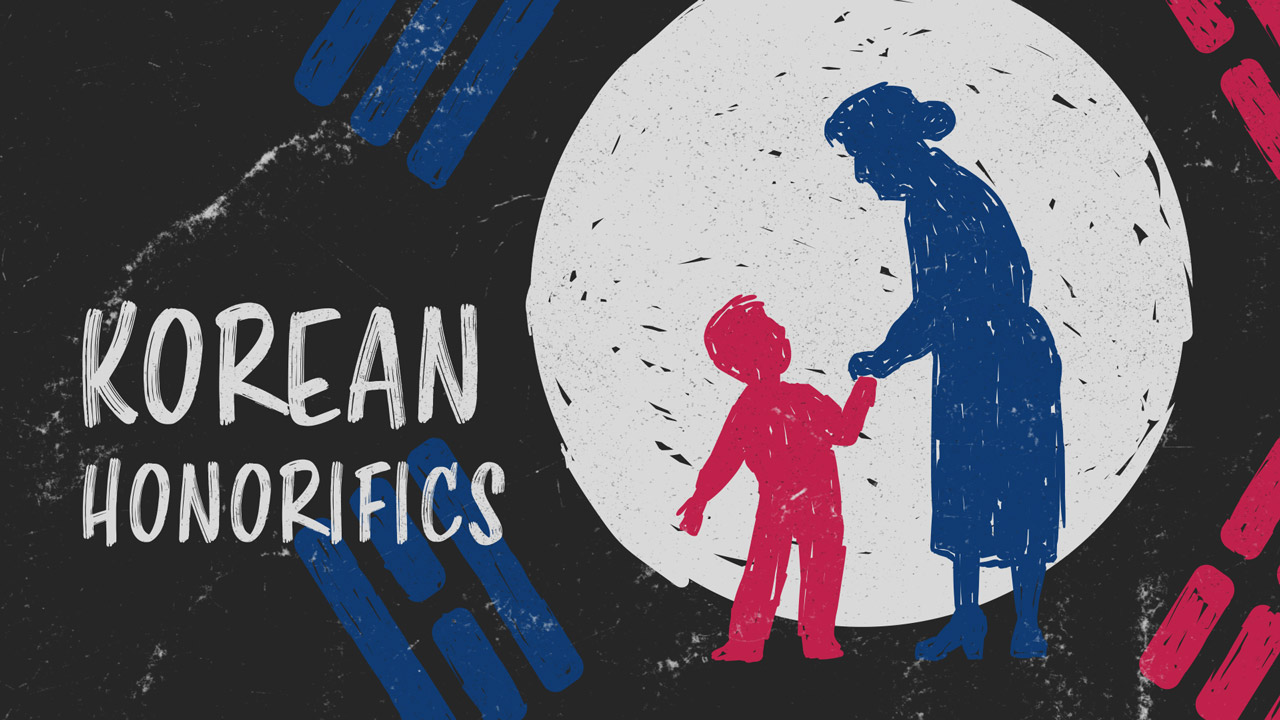30 Must-Know Korean Honorifics to Show Respect in Korea
People who recently started learning Korean often wonder: “What are Korean honorifics? What are these short suffixes attached to people’s names? Why do Koreans use honorifics?”
If you’ve ever asked yourself these questions (especially after watching popular K-dramas which use them all the time!) then this is the article for you.
Honorifics are a critical part of the Korean culture and language. It’s how you show respect to your family, your boss and co-workers, and even your friends.
I’m sure you’ve heard them before. You can’t watch a Korean romcom or variety show without hearing honorific titles like “Oppa!”
So, let’s learn what they mean, how to use them, and the Korean vocabulary you need to know.
Korean Honorifics: An Overview
Honorifics are titles that show respect. We have these in English, too — titles like Mr., Ms., Mrs., Dr., or even Sir and Ma’am.
All these are honorific titles in English to show politeness and respect.
While they’ve become less common in English, they’re still essential to everyday conversation in Korean.
A lot of this comes down to the influence of Confucianism and the social hierarchy of Korean society. It’s critical for individuals to represent their families and company well by maintaining proper etiquette.
Honorifics can also be speech patterns. You’ll see honorific verb endings and different pronouns used to sound more humble and show respect.
Korean Honorifics and Age
When it comes to when to use Korean honorifics, you need to know who you’re talking to and their age. Asking someone’s age is one of the most common questions you’ll be asked in Korean.
That’s because age determines a lot of the formality of a relationship.
It determines which honorifics you’ll use and what speech level, for sure. But it’ll also determine who pours the soju during a night out (the youngest person), who has to pay the bill (the oldest person), who can begin eating first and set the tone during a meal (also the oldest), and other social customs.
It’s funny though because there are a few ways to ask someone’s age… And it actually their age determines which one you should use.
Yeah, it’s a trap for sure!

If you’re speaking to someone obviously older, or in most formal situations, you’ll use (or hear) this phrase:
연세가 어떻게 되십니까? yeonsega eotteoke doesimnikka?
연세 (yeonse) is the word meaning “age” here.
In more casual situations or for someone who is obviously close in age to you, then you can say:
나이가 어떻게 되세요? naiga eotteoke doeseyo?
나이 (nai) and 연세 (yeonse) both mean “age”, but 나이 (nai) is the regular Korean noun for “age” while 연세 (yeonse) is the honorific form of the noun.
There’s also 몇 살이에요? (myeot sarieyo?) which is also “How old are you?” and in polite speech. But it’s considered to be a bit more casual than using naiga eotteoke doeseyo?
Every now and then, you might hear 몇 살이야? (myeot sariya?) which the casual form of 몇 살이에요? (myeot sarieyo).
For instance, I heard it while watching The Inheritors where the two characters were clearly the same age and more or less knew as much. (Not to mention they were being a bit cheeky by intentionally using casual speech.)
But since you shouldn’t use casual speech with those you don’t know, it’s best to use one of the more formal ways to ask someone’s age.
The last thing you should know is that Koreans use the Native Korean number system when talking about age. So make sure you brush up on those if you’re more used to the Sino-Korean system.
Korean Speech Levels
In Korean, there are a few different levels of speech to show politeness. The most common are informal speech, polite speech, and formal/honorific speech.
The most common way to distinguish the tone or politeness of speech is by the verb endings.
Verbs that end in -mnida are formal. If they end in -yo, then they’re formal speech. If they end in without the -yo, then it’s casual speech.
Besides that, there are specific words you use to sound more humble or more respectful. The top words (besides “age” that we already discussed) you’d want to memorize are:
- Name: 이름 (ireum) → 성함 (seongham)
- Person: 사람 (saram) → 분 (bun)
- Home: 집 (jip) → 댁 (daek)
- Rice: 밥 (bap) → 식사 (siksa)
- Birthday: 생일 (saeng-il) → 생신 (sangsin)
- Illness: 병 (byeong) → 병환 (byeonghwan)
- Words: 말 (mal) → 말씀 (malsseum)
- Child: 아이 (ai) → 자제분 (jajebun)
There’s also specific verbs you’ll use to be polite:
- To eat: 먹다 (meokda) → 드시다 (deusida)
- To drink: 마시다 (masida) → 드시다 (deusida)
- To be/to exist: 있다 (itda) → 계시다 (gyesida)
- To sleep: 자다 (jada) → 주무시다 (jumusida)
- To see/meet: 보다 (boda) → 뵙다 (boepda)
- To die: 죽다 (jukda) → 돌아가시다 (dor-agasida)
- To ask: 묻다 (mudda) → 여쭈다 (yeojjuda)
Korean Honorifics: Pronouns
There are a few honorific pronouns you need to know that are commonly used when talking to someone older or of higher status. They are:
- I: 나 (na) → 저 (jeo)
- We: 우리 (uri) → 저희 (jeohi)
- You: 너 (neo) → 당신 (dangsin)
Because the family is considered a unit and each member represents the family, it’s common to use “we” in formal situations when talking about family things. Instead of “my dad” it’d be “our father”, or “my home” would be “our home”.
Also, the “you” pronouns aren’t used often at all. Instead, you’d be more likely to use their title or name, plus one of the honorifics below.
Korean Honorifics: Titles
Let’s first start with general Korean honorific titles. These are the titles you’ll hear most often.
님 (nim)
님 (nim) means either “sir” or “ma’am”. You’ll use this one with someone who is of higher status than you or offering you a service.
You’ll also be called your name plus 님 (nim) when addressed by someone providing you a service, as the customer/client/patient. (For example, a doctor’s office.)
So, you can use 님 (nim) with someone’s name. But it’s most common to use this with someone’s job title. Here are some examples:
- 대표님 (daepyonim) – “CEO”
- 사장님 (sajangnim) – “Boss” or “president”
- 선생님 (seonsaengnim) – “Teacher”
It’s also common to add this to some family titles to make them more formal or polite, such as “grandfather” is 할아버지님 (harabeojinim).
씨 (ssi)
This suffix is more like “Mr.” or “Mrs.” in English, and it’s the most generic and common to use. If you’re not sure which honorific to use, this one is your safest bet.
Keep in mind, this one should be used for someone around the same social status and age as you.
If you’re familiar with Japanese, you may know that Japanese honorifics follow someone’s last name. But in Korean, that’s not the case.
You either need to use their full name + 씨 (ssi), with 씨 (ssi) attaching to the first name, or use their first name + 씨 (ssi). For example:
- 김탄씨 (Kim Tan-ssi) – Mr. Kim Tan
- 탄씨 (Tan-ssi) – Mr. Tan
Although adding “Mr.” sounds a bit formal here, it’s not too formal, like 님 (nim). You would use this with your classmates, for example.
선배님 (seonbaenim)
선배 (seonbae or sometimes romanized as sunbae in Korean) means “upperclassman” or “senior”. You’ll often attach 님 (nim) to the title when talking to or about your upperclassmen.
The opposite would be 후배님 (hubaenim), where 후배 (hubae) means “junior” and someone younger or in a lower grade than you.
Honorific Titles for Family (and Others)
There are certain family honorifc titles that are so common to hear in everyday life. The most common are oppa in Korean, hyung/hyeong (depending on romanization), nuna/noona, and eonni/unnie.
Let’s first start with the meaning of oppa. What does oppa mean? You hear it all. the. time.
Well, 오빠 (oppa) means “older brother” when addressed by a woman. But it’s also used for any close guy friend who is older than her. A woman may even call a boyfriend or husband 오빠 (oppa) to show affection.
The same is true for 언니 (eonni/unnie) in Korean. It’s what a woman would call her older sister, but also an older female friend.
As for hyeong/hyung’s meaning, it’s “older brother” when addressed by a guy. So 형 (hyeong) is what men would call their older brothers and guy friends who are older than them.
The same goes for nuna/noona’s meaning in Korean. 누나 (nuna) is “older sister” if you’re a man, and you’d use this term for any women you’re close with who are older than you.
You may also hear the word 동생 (dongsaeng), which means “younger sibling” as well.
Casual Honorific Titles
This may seem like an oxymoron, but there’s such a thing as casual honorifics. These are titles and suffixes used for friends, your children, or those close to you. They’re more to show affection rather than respect.
아 / 야 (a / ya) are often used as a suffix to first names. For example, 탄아 (Tan-a) is “Tan” but in an affectionate way.
If someone’s name ends in a vowel, you’d use 야 (ya) instead. Like 세리야 (Se-ri-ya).
(Don’t you love how all my examples are K-Drama names?)
Be Polite with Korean Honorifics
Phew! Feeling worried about all these Korean honorifics? Well, don’t worry about it too much.
While it takes some getting used to, the most common honorific terms are used so often you’ll quickly get the hang of them.
And in case you didn’t notice, one of my favorite ways to pick them up is with Korean TV shows and Korean movies. I’ll listen for the honorifics they use, which help me understand how to use them between ages and social status.
But no matter how you practice your honorifics, as long as you use them, you’re doing great! And remember: when in doubt, you can always use 씨 (ssi).
Now, if you’re ready for more politeness, master your manners by learning thank you in Korean. Or why not move onto something more fun and try learning a rainbow of colors in Korean?



Social